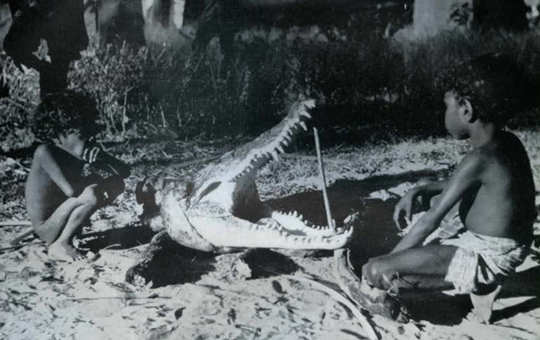Oceanian Section

Vol. XXI / No. 3
By: Jane Goodale
“Alonga Bush”: A Tiwi Hunt
It was April when I arrived on Melville Island, in the company of a small group of men, with the […]
View Article
Vol. XIX / No. 1
By: Ward Goodenough
The Pageant of Death in Nakanai: A Report of the 1954 Expedition to New Britain
Romantic tradition in the western world pictures primitive communities as exciting combinations of colorful dress, bizarre customs, and sinister rites. […]
View Article
Vol. XVIII / No. 3
By: Schuyler Cammann
Carvings in Walrus Ivory
When anyone mentions walrus ivory, we immediately think of small Eskimo carvings from the northernmost parts of the world. The […]
View Article
Vol. XVII / No. 1
By: Keith Little
My Father, The Crocodile: A Papuan Legend
During my recent visit to Papua and New Guinea, I had occasion to spend a weekend at the Sogeri Education […]
View Article
Vol. XVII / No. 1
By: W. H. G.
Ethnological Reconnaissance in New Guinea
Some of the finest of the University Museum’s collections come from New Guinea and the adjacent islands. For some time, […]
View Article
Vol. XVI / No. 3
By: Lincoln Kirstein
Lincoln Kirstein: Ballet
Mr. Kirstein was the only selector to choose a piece from the Museum’s large New Ireland collection. Of this dance […]
View Article
Vol. XVI / No. 3
By: Rene D'Harnoncourt
Rene D’Harnoncourt: Museum of Modern Art
Mr. d’Harnoncourt chose a Sepik River wood sculpture from New Guinea. That is a fine thing without any qualification. I […]
View Article
Vol. XVI / No. 3
By: Charles Addams
Charles Addams: ...Of The New Yorker
Charles Addams chose this figure of a whale from a Tlingit helmet, Southeast Alaska, and remarked: These objects were selected […]
View Article
Vol. XVI / No. 3
By: Jacques Lipchitz
Jacques Lipchitz: Sculptor
Mr. Lipchitz was asked why he had chosen this Mayan stone relief from Honduras, and he said: When you asked […]
View Article
Vol. XVI / No. 3
By: Franklin C. Watkins
Franklin C. Watkins: Painter
Mr. Watkins liked this bamboo zither from Borneo and said: In the room where all the musical instruments are stored […]
View Article
